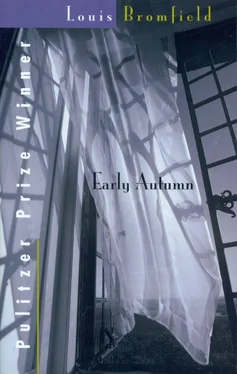There were evenings when Mrs. Soames sent word that she was feeling too ill to play, and on those occasions John Pentland drove over to see her, and the bridge was played instead at Brook Cottage with O’Hara and a fourth recruited impersonally from the countryside. To Sabine, the choice was a matter of indifference so long as the chosen one could play well.
It happened on these occasions that O’Hara and Olivia came to play together, making a sort of team, which worked admirably. He played as she knew he would play, aggressively and brilliantly, with a fierce concentration and a determination to win. It fascinated her that a man who had spent most of his life in circles where bridge played no part, should have mastered the intricate game so completely. She fancied him taking lessons with the same passionate application which he had given to his career.
He did not speak to her again of the things he had touched upon during that first hot night on the terrace, and she was careful never to find herself alone with him. She was ashamed at the game she played—of seeing him always with Sabine or riding with Sybil and giving him no chance to speak; it seemed to her that such behavior was cheap and dishonest. Yet she could not bring herself to refuse seeing him, partly because to refuse would have aroused the suspicions of the already interested Sabine, but more because she wanted to see him. She found a kind of delight in the way he looked at her, in the perfection with which they came to understand each other’s game; and though he did not see her alone, he kept telling her in a hundred subtle ways that he was a man in love, who adored her.
She told herself that she was behaving like a silly schoolgirl, but she could not bring herself to give him up altogether. It seemed to her unbearable that she should lose these rare happy evenings. And she was afraid, too, that Sabine would call her a fool.
As early summer turned into July, old Mrs. Soames came less and less frequently to play bridge and there were times when Sabine, dining out or retiring early, left them without any game at all and the old familiar stillness came to settle over the drawing room at Pentlands … evenings when Olivia and Sybil played double patience and Anson worked at Mr. Lowell’s desk over the mazes of the Pentland Family history.
On one of these evenings, when Olivia’s eyes had grown weary of reading, she closed her book and, turning toward her husband, called his name. When he did not answer her at once she spoke to him again, and waited until he looked up. Then she said, “Anson, I have taken up riding again. I think it is doing me good.”
But Anson, lost somewhere in the chapter about Savina Pentland and her friendship with Ingres, was not interested and made no answer.
“I go in the mornings,” she repeated, “before breakfast, with Sybil.”
Anson said, “Yes,” again, and then, “I think it an excellent idea—your color is better,” and went back to his work.
So she succeeded in telling him that it was all right about Sybil and O’Hara. She managed to tell him without actually saying it that she would go with them and prevent any entanglement. She had told him, too, without once alluding to the scene of which he was ashamed. And she knew, of course, now, that there was no danger of any entanglement, at least not one which involved Sybil.
Sitting with the book closed in her lap, she remained for a time watching the back of her husband’s head—the thin gray hair, the cords that stood out weakly under the desiccated skin, the too small ears set too close against the skull; and in reality, all the while she was seeing another head set upon a full muscular neck, the skin tanned and glowing with the flush of health, the thick hair short and vigorous; and she felt an odd, inexplicable desire to weep, thinking at the same time, “I am a wicked woman. I must be really bad.” For she had never known before what it was to be in love and she had lived for nearly twenty years in a family where love had occupied a poor forgotten niche.
She was sitting thus when John Pentland came in at last, looking more yellow and haggard than he had been in days. She asked him quietly, so as not to disturb Anson, whether Mrs. Soames was really ill. “No,” said the old man, “I don’t think so; she seems all right, a little tired, that’s all. We’re all growing old.”
He seated himself and began to read like the others, pretending clearly an interest which he did not feel, for Olivia caught him suddenly staring before him in a line beyond the printed page. She saw that he was not reading at all, and in the back of her mind a little cluster of words kept repeating themselves—“a little tired, that’s all, we’re all growing old; a little tired, that’s all, we’re all growing old”—over and over again monotonously, as if she were hypnotizing herself. She found herself, too, staring into space in the same enchanted fashion as the old man. And then, all at once, she became aware of a figure standing in the doorway beckoning to her, and, focusing her gaze, she saw that it was Nannie, clad in a dressing gown, her old face screwed up in an expression of anxiety. She had some reason for not disturbing the others, for she did not speak. Standing in the shadow, she beckoned; and Olivia, rising quietly, went out into the hall, closing the door behind her.
There, in the dim light, she saw that the old woman had been crying and was shaking in fright. She said, “Something has happened to Jack, something dreadful.”
She had known what it was before Nannie spoke. It seemed to her that she had known all along, and now there was no sense of shock but only a hard, dead numbness of all feeling.
“Call up Doctor Jenkins,” she said, with a kind of dreadful calm, and turning away she went quickly up the long stairs.
In the darkness of her own room she did not wait now to listen for the sound of breathing. It had come at last—the moment when she would enter the room and, listening for the sound, encounter only the stillness of the night. Beyond, in the room which he had occupied ever since he was a tiny baby, there was the usual dim night-light burning in the corner, and by its dull glow she was able to make out the narrow bed and his figure lying there as it had always lain, asleep. He must have been asleep, she thought, for it was impossible to have died so quietly, without moving. But she knew, of course, that he was dead, and she saw how near to death he had always been, how it was only a matter of slipping over, quite simply and gently.
He had escaped them at last—his grandfather and herself—in a moment when they had not been there watching; and downstairs in the drawing room John Pentland was sitting with a book in his lap by Mr. Longfellow’s lamp, staring into space, still knowing nothing. And Anson’s pen scratched away at the history of the Pentland Family and the Massachusetts Bay Colony, while here in the room where she stood the Pentland family had come to an end.
She did not weep. She knew that weeping would come later, after the doctor had made his silly futile call to tell her what she already knew. And now that this thing which she had fought for so long had happened, she was aware of a profound peace. It seemed to her even, that the boy, her own son, was happier now; for she had a fear, bordering upon remorse, that they had kept him alive all those years against his will. He looked quiet and still now and not at all as he had looked on those long, terrible nights when she had sat in this same chair by the same bed while, propped among pillows because he could not breathe lying down, he fought for breath and life, more to please her and his grandfather than because he wanted to live. She saw that there could be a great beauty in death. It was not as if he had died alone. He had simply gone to sleep.
Читать дальше












